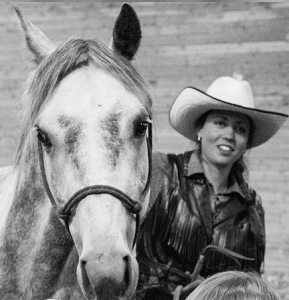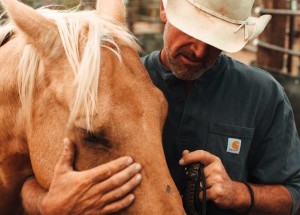Knowing and controlling how your movements, behavior, and thoughts impact your equine partner is the absolute key to your good horsemanship.
While BestHorsePractices is dedicated to reviewing equine science, some new human research is immensely relevant to our horsemanship. Let’s consider confidence, fear, power, and cross-modal research.
This article was spurred by conversations with talented horsemen Amy Skinner and West Taylor. They said, in different ways and during separate interviews: in order to get right with horses, I first had to get right with myself.
Without me learning about me, there’s no way I could be as comfortable with the horses. The horses need the truth. Before, I would have been in the position of blame or excuses. But it’s never their fault. That’s been one of the biggest things for me to learn. I’m creating everything, even the sucky stuff. So, I’ve learned to be accountable to that. And, wow, that’s empowering.
Skinner:
 This horsemanship stuff is so much more than just good reflexes, knowledge of the horse, and smooth rope and rein handling. I have to be centered to help the horse. Just having skill isn’t enough. You have to be quiet inside, to be still enough to listen and observe, and you have to be able to offer real peace to the horse. In order to do that, you have to have peace with yourself.
This horsemanship stuff is so much more than just good reflexes, knowledge of the horse, and smooth rope and rein handling. I have to be centered to help the horse. Just having skill isn’t enough. You have to be quiet inside, to be still enough to listen and observe, and you have to be able to offer real peace to the horse. In order to do that, you have to have peace with yourself.
Know thyself.
It’s simple, but it ain’t easy.
Here are highlights from four recent research projects to help shed light on how your movements, behavior, and thoughts impact your equine partner. The science also gives insight to our human-to-human relationships.
FEAR
Fear is mostly an instinctual, emotional response triggered by the brain’s amygdala. Read more about fight and flight here. However, it can be moderated by the thinking part of the brain (the neocortex). Experimenters profiled on the radio program Invisibilia highlighted some these findings:
Knowing more about what you fear can help lessen your anxiety. Confronting your demons works.
Deliberately staying outside your comfort zone can be effective, too:
One interviewee, whose girlfriend had recently left him, got cold sweats every time he faced the prospect of being rejected. He improvised his own ‘rejection therapy.’ Each day, he would propose offers or pose questions with the deliberate intention of being rejected. Over time, he got more and more comfortable with what was once a paralyzing trepidation. Read more about the Cons of Comfort.
Fear stinks
Researchers at Stony Brook University collected sweat from admittedly terrified skydivers ready to jump out of a plane for the first time. They then had subjects smell those swabs of ‘fearful sweat.’ Using functional MRI technology (monitoring brain activity in real time), researchers were able to see the amygdala light up. When those subjects smelled swabs from non-fearful,  exercise-induced sweat, the amygdala was not engaged. Read more here.
exercise-induced sweat, the amygdala was not engaged. Read more here.
VOICE
Your voice reflects your leadership and authority.
Researchers at San Diego State University have been studying the impact of voice. They noted that confident, assertive subjects tend to have steadier, less sing-songy voices. They are also more dynamic and flow in and out of loudness.
It goes both ways: listeners buy in to your confidence or lack thereof:
Subjects listening to different voices identified ‘powerful’ voices as those that were steadier and less sing-songy. Researchers can reliably predict if speaking subjects were in positions of power simply by listening to their voices.
POWER & EXPERTISE
Experts are good talkers, lousy listeners. Researchers at Loyola University in Chicago found experts to be more close-minded and dogmatic than Regular Joes.
 Theoretically, experts already have given a lot of thought to issues within their area of expertise. They have “earned” the privilege of harboring more dogmatic opinions, said the researchers.
Theoretically, experts already have given a lot of thought to issues within their area of expertise. They have “earned” the privilege of harboring more dogmatic opinions, said the researchers.
They gave subjects different exams that left one group confident about their abilities and another group unsure. The first group “became more rigid in their thinking and less willing to consider new points of view.”
“The role of being an expert changes the way you think and behave. You should be vigilant to those risks,” said the researchers.
Be vigilant about your own “earned dogmatism” and be wary of experts who’ve lost their ability to listen. (Zen Buddhists, by the way, believe it’s best to always think like a beginner.)
Adding icing to the cake of arrogance, a study by Dr. Paul Piff in the Personality and Social Psychology Bulletin found that wealthier individuals of higher social class are more narcissistic, feel more entitled, look in the mirror more, and are less charitable, less helpful, less trusting than those of lower class and with less money.
Check out this TED talk about how your posture impacts your life (including your cortisol levels).
Crossmodal Research
Be aware of the impact of all your senses. Your ears, not your tongue, will tell you if that chip is stale.
Researchers at the Crossmodal Research Lab at Oxford University study how the brain integrates information from the five human senses to produce a coherent impression of reality. These modes of perception influence one another on the way to  becoming conscious thought.
becoming conscious thought.
Did you know?
- Coffee tastes less sweet in a white mug.
- A chip tastes fresher when its crunch is louder.
- Soup tastes saltier when served in a blue bowl.
- The shape of a chocolate bar and the sound of its name influence how sweet it tastes.
Charles Spence, whose work falls into the area of cognitive psychology, says about half of our experience of food and drink is determined by the forgotten flavor senses of vision, sound, and touch.
Take Away: When you make choices for your horse, be aware of how companies are increasingly using neuroscience in their packaging and presentation to come up with the ultimate sensory package of appeal. And, of course, don’t buy a horse just because it’s pretty.
